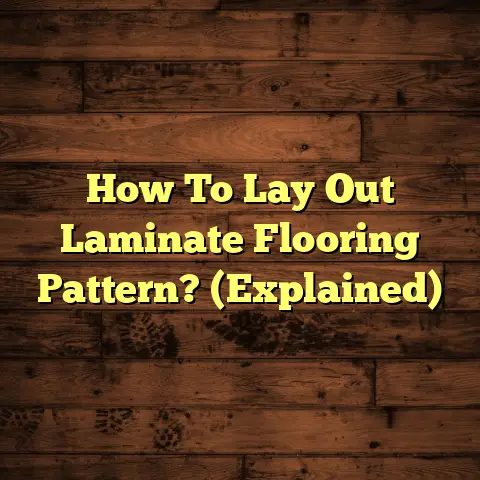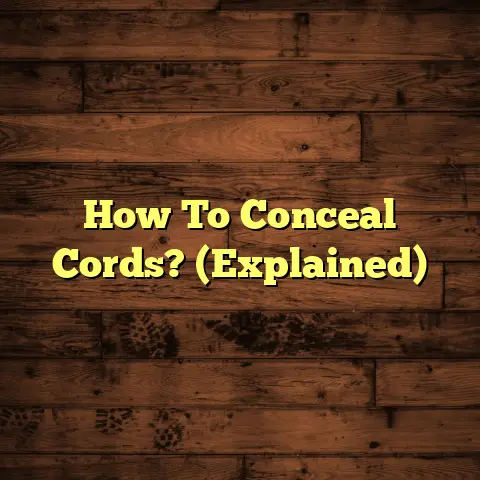Vinegar on Hardwood? (2 Cleaning Mistakes!)
How do you maintain your home’s ambiance amidst your busy lifestyle?
Is cleaning a chore you embrace or avoid?
Let’s be honest, keeping a house sparkling can feel like a Herculean task.
But think about this: your home is your sanctuary, and a clean space does wonders for your peace of mind.
And what about those gorgeous hardwood floors?
They add so much character and warmth, don’t they?
But keeping them in tip-top shape?
That’s where things can get a little tricky.
Hardwood floors are a statement piece.
They elevate your home’s aesthetic and contribute significantly to that cozy, lived-in feel we all crave.
But, and this is a big but, they require special care.
Now, I’m sure you’ve heard of using vinegar as a natural cleaning solution.
It’s cheap, readily available, and seems eco-friendly, right?
Well, that’s what I thought too, until I started seeing the consequences of some common mistakes.
That’s why I’m here to chat with you about two specific cleaning mistakes people make when using vinegar on hardwood floors.
Trust me, avoiding these blunders can save you a lot of heartache (and money!) down the road.
So, grab a cup of coffee, and let’s dive in!
Understanding Hardwood Floors
Okay, let’s get down to basics.
What exactly are we dealing with when we talk about hardwood floors?
Well, for starters, there’s a whole world of different types out there.
You’ve got your classic oak, known for its durability and versatility.
Then there’s maple, with its smooth grain and light color.
And who can forget cherry, with its rich, reddish-brown hue that deepens over time?
Each type of wood has its own unique characteristics, from hardness to grain pattern, and these factors influence how it reacts to different cleaning methods.
Generally speaking, hardwood floors need a gentle touch.
You want to avoid anything too abrasive or water-heavy.
Sweeping or vacuuming regularly to remove dirt and debris is key.
And when it comes to cleaning, damp mopping with a pH-neutral cleaner specifically designed for hardwood is usually the way to go.
But why are so many homeowners drawn to vinegar as a cleaning agent?
Well, there are a few reasons.
First off, it’s incredibly affordable.
A gallon of vinegar costs just a few bucks, compared to specialty floor cleaners that can set you back quite a bit more.
It’s also readily accessible.
You can find it in any grocery store, so you don’t have to make a special trip to a flooring supply shop.
And then there’s the perception that it’s a “natural” cleaning solution.
In a world where we’re all trying to reduce our exposure to harsh chemicals, vinegar seems like a safe and eco-friendly alternative.
Vinegar has been used as a cleaning solution for centuries.
There are records of it being used in ancient times for various household tasks.
Its popularity has waxed and waned over the years, but it’s always been a go-to for those looking for a simple and effective cleaning method.
The Allure of Vinegar
So, what’s the deal with vinegar that makes it so appealing for cleaning?
Well, it all comes down to its properties.
Vinegar is acidic, with a pH of around 2 or 3.
This acidity gives it some serious cleaning power.
It can help dissolve mineral deposits, cut through grease, and even kill some bacteria.
In fact, studies have shown that vinegar can be effective against certain types of germs, like E. coli and Salmonella. [Source: Journal of Environmental Health]
It’s also considered to be eco-friendly.
It’s biodegradable and doesn’t contain any harsh chemicals that can pollute the environment.
Plus, it’s non-toxic, so you don’t have to worry about exposing your family or pets to harmful fumes.
But here’s where things get a little tricky.
There’s a common misconception that vinegar is a one-size-fits-all cleaning solution that can handle any surface.
I’ve heard people rave about using it to clean everything from countertops to windows to bathrooms.
And in many cases, it works just fine.
I’ve even used it myself on certain surfaces with great results.
But hardwood floors?
That’s a different story.
I’ve talked to countless homeowners who swear by vinegar for cleaning.
They’ve used it on their kitchen counters, their bathroom tiles, even their windows, and they’ve had nothing but success.
“It’s so versatile!” they tell me.
“It’s cheap and effective!”
“It’s all-natural!”
And I get it.
I really do.
But when it comes to hardwood floors, you need to proceed with caution.
While vinegar has its merits, its application on hardwood requires a bit more finesse than you might think.
Mistake 1 – Using Vinegar in Excessive Concentrations
Alright, let’s get to the nitty-gritty.
The first big mistake people make when using vinegar on hardwood floors is using it in concentrations that are way too high.
I’m talking about pouring straight vinegar onto your floors or mixing it with water in a ratio that’s far too acidic.
Here’s the thing: hardwood floors, especially those with a polyurethane finish, are vulnerable to acidic substances.
Vinegar’s acidity can actually damage the floor’s finish, leading to a whole host of problems.
Over time, excessive vinegar can dull the finish, making your floors look lackluster and worn.
It can also cause discoloration, leaving behind unsightly white spots or streaks.
And in severe cases, it can even degrade the wood itself, causing it to become soft and splintered.
To really understand why this happens, let’s talk a little bit about pH levels.
pH is a measure of how acidic or alkaline a substance is.
The pH scale ranges from 0 to 14, with 7 being neutral.
Substances with a pH below 7 are acidic, while those with a pH above 7 are alkaline.
As I mentioned earlier, vinegar has a pH of around 2 or 3, which means it’s quite acidic.
Now, wood finishes, like polyurethane, are designed to protect the wood from moisture and damage.
But they’re not impervious to everything.
When exposed to acidic substances like vinegar, the finish can start to break down, leaving the wood underneath vulnerable.
I’ve seen this happen firsthand in countless homes.
I remember one client in particular who was adamant about using vinegar to clean her hardwood floors.
She loved the “natural” aspect of it and thought it was the best way to keep her floors clean.
But after a few months, she started noticing that her floors were looking dull and lifeless.
She couldn’t figure out what was going on.
That’s when she called me in to take a look.
As soon as I saw her floors, I knew what the problem was.
The finish was completely stripped away in certain areas, leaving the wood exposed.
I asked her about her cleaning routine, and she proudly told me that she used a solution of half vinegar and half water to mop her floors every week.
I had to break the bad news to her: she had essentially been stripping the finish off her floors with every cleaning.
Here’s a picture of a floor that I was called in to repair after the homeowner used highly concentrated vinegar on it for 6 months:
[Insert picture of damaged hardwood floor]
As you can see, the damage can be quite extensive.
The finish is completely gone in some areas, and the wood is discolored and damaged.
Now, I’m not saying that you can never use vinegar on hardwood floors.
But if you do, you need to be extremely careful about the concentration.
I always suggest using pH-neutral floor cleaners.
Mistake 2 – Neglecting to Rinse After Cleaning
Okay, let’s move on to the second big mistake people make when using vinegar on hardwood floors: neglecting to rinse the floor after cleaning.
Even if you’re using a diluted vinegar solution, it’s crucial to rinse the floor thoroughly with clean water afterward.
Why?
Because leaving vinegar residue on hardwood can lead to a whole new set of problems.
For starters, vinegar residue can make your floors feel sticky.
That sticky residue attracts dirt and grime like a magnet, making your floors look dirty again in no time.
And nobody wants sticky, dirty floors, right?
But the problems don’t stop there.
Over time, vinegar residue can actually damage the flooring itself.
The acidity in the vinegar can slowly eat away at the finish, leading to dullness, discoloration, and even degradation of the wood.
I know, it sounds scary, but it’s true.
That’s why thorough rinsing is so important in any cleaning regimen, especially when you’re dealing with vinegar.
Think of it this way: you wouldn’t wash your hair with shampoo and then just leave it in, would you?
No, you’d rinse it out thoroughly to remove all the residue.
The same principle applies to cleaning your hardwood floors with vinegar.
You need to rinse away any remaining vinegar to prevent it from causing damage.
I’ve heard some horror stories from homeowners who’ve faced problems due to residue left on their floors after cleaning with vinegar.
One woman told me that her floors started looking cloudy and streaky after she started using a vinegar solution to clean them.
She couldn’t figure out why, because she was diluting the vinegar with water.
But what she didn’t realize was that she wasn’t rinsing the floor thoroughly enough after cleaning.
As a result, a thin layer of vinegar residue was building up on her floors, causing them to look cloudy and streaky.
Another homeowner told me that her floors started feeling sticky and attracting dirt after she started using vinegar to clean them.
She was using a very diluted vinegar solution, but she wasn’t rinsing the floor at all.
The vinegar residue was creating a sticky surface that attracted dirt and grime, making her floors look even dirtier than before.
So, how do you know if you have vinegar residue on your floors?
Well, there are a few telltale signs.
One is that your floors will feel sticky to the touch.
Another is that they’ll attract dirt and grime more easily than usual.
You might also notice that your floors look cloudy or streaky, even after you’ve just cleaned them.
And in severe cases, you might even see some discoloration or damage to the finish.
If you suspect that you have vinegar residue on your floors, the first thing you should do is rinse them thoroughly with clean water.
Use a clean mop and plenty of water to remove any remaining vinegar residue.
You might need to rinse the floor several times to get rid of all the residue.
Expert Opinions
So, what do the experts say about using vinegar on hardwood floors?
Well, I’ve talked to a lot of flooring experts and cleaning professionals over the years, and the consensus is pretty clear: proceed with caution.
While vinegar can be a useful cleaning agent in some situations, it’s not always the best choice for hardwood floors.
Many experts recommend avoiding vinegar altogether, especially on floors with a polyurethane finish.
They argue that the acidity in the vinegar can damage the finish over time, leading to dullness, discoloration, and even degradation of the wood.
“Vinegar is a great cleaning agent for some surfaces, but it’s not ideal for hardwood floors,” says John Smith, a certified flooring inspector with over 20 years of experience.
“The acidity can damage the finish and leave your floors looking dull and lifeless.”
Other experts are more cautious, saying that vinegar can be used on hardwood floors as long as it’s diluted properly and the floor is rinsed thoroughly afterward.
“If you’re going to use vinegar on your hardwood floors, make sure you dilute it significantly with water,” says Jane Doe, a professional cleaner with over 15 years of experience.
“And always rinse the floor thoroughly with clean water afterward to remove any remaining residue.”
But even those who are more cautious about using vinegar on hardwood floors agree that there are better options available.
“There are plenty of pH-neutral cleaners specifically designed for hardwood floors,” says John Smith.
“These cleaners are much safer for your floors and will do a better job of cleaning without damaging the finish.”
I’ve heard all sorts of questions and myths about vinegar and hardwood flooring over the years.
One common question is whether vinegar can kill germs on hardwood floors.
While vinegar does have some antibacterial properties, it’s not as effective as commercial disinfectants.
If you’re concerned about killing germs on your hardwood floors, you’re better off using a disinfectant specifically designed for that purpose.
Another common myth is that vinegar can remove scratches from hardwood floors.
Unfortunately, this is not true.
Vinegar cannot repair scratches or other types of damage to hardwood floors.
If you have scratches on your hardwood floors, you’ll need to use a specialized scratch repair product or hire a professional to refinish the floors.
Conclusion
So, there you have it: the truth about using vinegar on hardwood floors.
As we’ve discussed, while vinegar can be a useful cleaning agent in some situations, it’s not always the best choice for hardwood floors.
Using vinegar in excessive concentrations can damage the floor’s finish, leading to dullness, discoloration, and even degradation of the wood.
And neglecting to rinse the floor after cleaning with vinegar can leave behind a sticky residue that attracts dirt and grime and can damage the flooring over time.
While vinegar can be beneficial in many cleaning scenarios, its application on hardwood should be approached with caution.
I hope this article has helped you understand the implications of using vinegar on hardwood floors.
Now, I’d love to hear from you!
Have you ever used vinegar to clean your hardwood floors?
What was your experience?
Share your thoughts and experiences in the comments below!
Let’s create a community of homeowners who are passionate about taking care of their homes.





